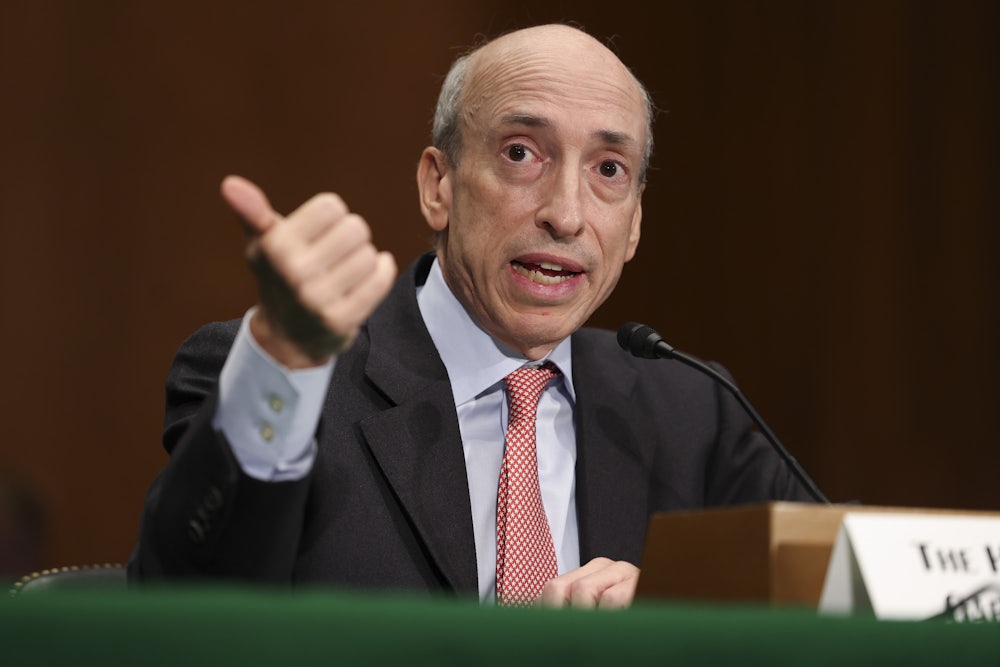The Securities and Exchange Commission regulates securities and the exchanges on which they are traded. Many (if not nearly all) cryptocurrencies are securities, and they are often traded on exchanges. Therefore, the SEC has the authority to regulate them. This is painfully obvious to everyone—except the cryptocurrency community, which has aggressively pretended otherwise for years.
It therefore came as little surprise this week that the SEC announced charges against the two largest crypto exchanges, Coinbase and Binance, for violating federal securities laws. The SEC alleges that the two companies were operating unregistered securities exchanges and hawking unregistered securities. (Binance also got hit with some fraud-related allegations, but we’ll come back to that later.) The allegations are so obvious that crypto leaders could only shrug them off and say they’d try building a loophole to escape them.
“The SEC’s reliance on an enforcement-only approach in the absence of clear rules for the digital asset industry is hurting America’s economic competitiveness and companies like Coinbase that have a demonstrated commitment to compliance,” Paul Grewal, Coinbase’s top lawyer, said in a statement after the SEC charges were announced. “The solution is legislation that allows fair rules for the road to be developed transparently and applied equally, not litigation. In the meantime, we’ll continue to operate our business as usual.”
This is probably not the end of the road for cryptocurrency itself. But it may be the beginning of the end of an era in which the crypto “industry,” such as it is, aggressively sought to change the financial world’s rules while it blithely ignored them. It failed to change securities laws, and now securities laws are about to change it.
Top crypto hawks have claimed to seek “regulatory clarity” from Washington on cryptocurrency and securities laws for years. (Grewal used a variant of this himself by referring to “clear rules.”) By “regulatory clarity,” they did not mean clarity in the sense of a clear explanation of how current securities laws apply to us. They meant clarity in the sense of clarification by the government that it will either not regulate cryptocurrencies at all or, alternatively, regulate them only to the extent that crypto enthusiasts desire.
In reality, the Securities and Exchange Act of 1934 and the Supreme Court’s rulings on it are fairly clear about what is and isn’t a security. Under the Howey test, which is named for the 1946 Supreme Court case that articulated it, a security is (1) an investment of money in (2) a common enterprise with (3) the expectation of profit that’s (4) derived from the efforts of others. The SEC argued that Coinbase’s staking program, in which crypto owners transferred their crypto assets to the company in exchange for future returns, met that four-part test.
“For each of these five assets,” the SEC explained in its complaint, referring to the five cryptocurrencies used in the program, “Coinbase pools the assets provided to Coinbase by investors in the Staking Program in omnibus crypto asset wallets controlled by Coinbase (and segregated by asset), and then performs all of the efforts necessary and expected by investors to obtain investment returns marketed by Coinbase, including staking those assets in order to obtain rewards, which Coinbase distributes pro rata to investors after paying itself a 25 or 35% commission.”
Not every cryptocurrency is considered a security. The SEC formally considers bitcoin to be a commodity in no small part because it is completely decentralized. Gary Gensler, who took over as SEC chair after that decision was made, has not tried to reverse it. But under his tenure the agency has pointedly declined to extend that conclusion to any other cryptocurrency on the market. That includes popular alternatives like ether, the native cryptocurrency of the Ethereum blockchain, or dogecoin, a meme cryptocurrency that Elon Musk has promoted.
The SEC also alleged that Coinbase, which sought to position itself as a responsible and compliant actor in the crypto space, claimed to be using the Howey test to scrutinize cryptocurrencies that it offered on its exchange while accepting multiple currencies that plainly violated that standard. “As such, Coinbase has elevated its interest in increasing its profits over investors’ interests, and over compliance with the law and the regulatory framework that governs the securities markets and was created to protect investors and the U.S. capital markets,” the agency said in its complaint.
Why not just register everything and come into compliance, you might ask? Part of the answer is ideological. Cryptocurrency’s whole premise is that traditional financial and governmental structures can’t be trusted and should be avoided. Beyond that, complying would also make it a lot harder to profit from crypto. Registering things as a security isn’t fun! There are disclosure requirements and licensing requirements and limits on who can trade them. That’s far removed from the freewheeling, regulation-defying world in which crypto exists.
That regulatory defiance can take a few different forms, of course. In Coinbase’s case, the company appears to have simply run an unregistered securities exchange and offered unregistered securities, then hoped that Congress would rewrite the nation’s securities laws to bail it out before the SEC dropped the hammer. It’s as if someone built a casino and then hoped that the state legislature would just legalize gambling.
That appears to still be the plan even after this week’s SEC actions. Coinbase CEO Brian Armstrong said on Tuesday that the company is “proud to represent the industry in court to finally get some clarity around crypto rules.” This is like jaywalking to get clarity on traffic laws. “Instead of publishing a clear rule book, the SEC has taken a regulation by enforcement approach that is harming America,” Armstrong audaciously claimed. “So if we need to avail ourselves of the courts to get clarity, so be it.”
Armstrong also noted that “this is why the US congress is introducing new legislation to fix the situation, and the rest of the world is moving to put clear rules in place to support this technology.” The implication here is that lawmakers need to act fast before they miss out on this exciting moneymaking scheme. But Congress has apparently moved on from cryptocurrency. While House Republicans are still reportedly showing some interest in writing favorable crypto laws, House Democrats are cooling on it and the Senate appears uninterested in taking any action. Capitol Hill’s focus has now turned to newer, shinier toys like artificial intelligence.
It also does not help matters that some crypto leaders, most notably FTX’s Sam Bankman-Fried, were very obviously trying to buy influence in Washington. That is not a problem for crypto in and of itself; industries buy influence in Washington all the time. But FTX collapsed late last year after most of its customer funds vanished, and Bankman-Fried, who was once crypto’s golden boy on Capitol Hill, awaits trial for a wide range of fraud and money-laundering charges. This has dampened enthusiasm in government circles for letting crypto be crypto, so to speak.
Neither Binance nor Coinbase is like FTX. They have not collapsed outright, and customers appear to be fine. But the two companies face significantly different struggles. The SEC’s claims against Coinbase are only focused on lack of registration and other (for want of a better term) procedural offenses against securities laws. For Binance, things are a little more serious. The SEC alleges that Binance actively misled U.S. regulators and American investors about its operations, transferring customer assets to other holding companies and artificially inflating market volume.
“Through thirteen charges, we allege that Zhao and Binance entities engaged in an extensive web of deception, conflicts of interest, lack of disclosure, and calculated evasion of the law,” Gensler said in a statement about the complaint. “As alleged, Zhao and Binance misled investors about their risk controls and corrupted trading volumes while actively concealing who was operating the platform, the manipulative trading of its affiliated market maker, and even where and with whom investor funds and crypto assets were custodied.”
I’ve referred to Binance as a singular entity throughout this article for clarity’s sake, but that isn’t strictly true. As the SEC detailed in its complaint, it actually consists of multiple holding companies that directly or indirectly answer to founder Changpeng Zhao. He allegedly opted for the complex structure to maximally shield Binance.com, the operation’s central hub, from regulation. You do not have to take the SEC’s word for this. It quoted Binance’s chief compliance officer as saying in 2020 that “because we do not want [Binance.com] to be regulated ever, we created local entities to be registered with the regulators, and ringfence accordingly.”
And while Binance claimed to apply securities laws to determine which cryptocurrencies it offered on its exchanges, internal documents suggest that process was intended to be a sham. The SEC’s complaint quoted a consultant who told the company to create an elaborate mechanism for determining when the Howey test applied and then engage with the SEC over possible solutions to its regulatory woes “with no expectation of success and solely to pause potential enforcement efforts.” That revelation certainly clears up the industry’s quest for “clarity.” You can probably imagine how the SEC’s enforcement division responded when they discovered that little nugget.
It is almost an American tradition at this point to let tech companies defy existing regulations long enough that they can rewrite the rules in their favor. Uber and Lyft did it to the taxicab industry. Airbnb did it to the housing and rental industry. But the financial industry proved to be a slightly harder nut to crack for the crypto companies that sprang up over the last half-decade. It turns out that financial regulations exist for a very good reason, as shown by all the people who lost everything when a wave of crypto companies went bust in 2022.
Crypto leaders will probably continue to seek “clarity” on how securities laws apply to them. They might even succeed in getting some of their products classified as commodities, which have lower regulatory thresholds. But the SEC’s filings show that everybody has known what was going on the entire time. The SEC’s complaint against Binance quoted its chief compliance officer as telling a colleague in 2018 that “we are operating as a fking [sic] unlicensed securities exchange in the USA bro.” Regulatory clarity, it seems, wasn’t all that hard to find.










